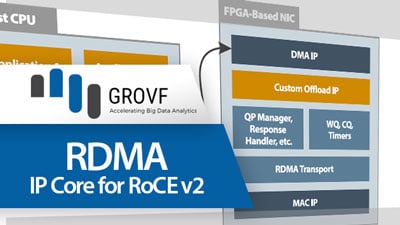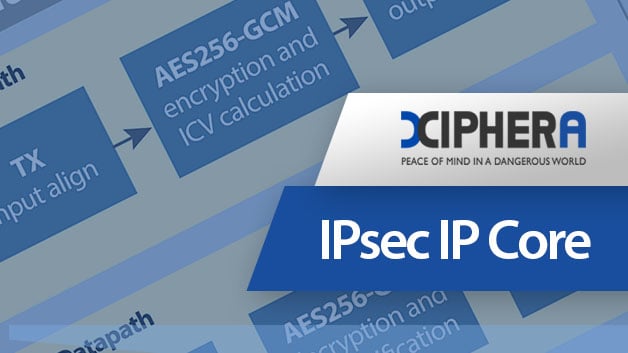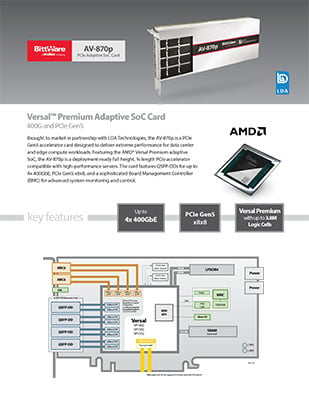AV-870p
High-Speed I/O and PCIe Gen5
In Partnership with
AMD's Next-Gen Programmable Hardware
The AMD Versal Adaptive SoCs integrate networked, power-optimized cores on an adaptable platform for the most challenging compute and networking applications.
- 7nm Architecture: Versal Premium architecture combines high bandwidth and compute density on an adaptable platform.
- PCIe Gen5 Support: Data transfer speeds 2x faster than Gen4, and high-speed interface between CPUs and workload accelerators.
7nm Architecture
The latest generation 7nm architecture combines adaptable compute engines with a breadth of hardened memory and interfacing technologies for superior performance/watt over competing 10nm FPGAs.
PCIe Gen5 Support
PCIe Gen5 supports data transfer speeds 2x higher than PCIe Gen4, providing greater performance capabilities to developers of PC interconnect, graphics adapters, and chip-level communications.
Need a Price Quote?
Ethernet Hard IP Conceptual Guide
Diagrams below show the basics of Hard IP blocks available for Ethernet. These diagrams are intended only to give a high-level understanding of possible configurations of network ports.
Contact us for specific capability questions at BittWare.com/contact.
Transceiver lane speed options for Ethernet
GTM
Each GTM: 4x lanes at 10G NRZ, 25G NRZ or PAM4, or 50G PAM4 (other non-Ethernet rates available)
GTYP
Each GTYP: 4x lanes at 10G or 25G NRZ (other non-Ethernet rates available)
Typical features driving chip/mezzanine options
Your particular needs will drive which is the best combination of chip and mezzanine:
Versal VP1402 + Standard QSFP-DD Mezzanine
(more using select TeraBox chassis)
Versal VP1502 + Standard QSFP-DD Mezzanine
Balance of network ports and chip resources
Versal VP1552 + Standard QSFP-DD Mezzanine
Maximize GTYPs for low latency and sub-10G (non-Ethernet) rates
Port Locations Map
For this guide, each ARC6 and QSFP-DD port is numbered as shown. Always defer to the HRG for port addressing from a development standpoint.
Using the dual ARC6 interfaces
One way to utilize the ARC6 connectors is as part of select TeraBox systems with front-panel QSFP-DDs that internally route to the card’s transceivers throught the ARC6 interfaces.
Options for card and server configurations vary. We recommend contacting us for more details at BittWare.com/contact.
Options using Versal VP1402 and Standard QSFP-DD Mezzanine
Options using Versal VP1502 and Standard QSFP-DD Mezzanine
Options using Versal VP1552 and Standard QSFP-DD Mezzanine
Options using Versal VP1552 and GTYP QSFP-DD Mezzanine
Alternative to the default mezzanine provides all-GTYP transceiver connections. Advantages include lower latency than GTMs and lower minimum (non-Ethernet) data rates to 1.25 Gb/s.
Example uses for specific Ethernet rates
Below are examples of how specific desired Ethernet rates can be achieved. Many more configurations are possible based on chip features, mezzanine options, user routing logic, and transceiver configuation. Specific Ethernet modules/cables required will also vary based on configuration, and often require breakout cables.
Example 1
4x 400 GbE
This first example pairs the Versal 1402 with the standard QSFP-DD mezzanine for 4x 400 GbE ports in a dual-slot configuration.
Need more 400 GbE ports? Talk to us about utilizing the ARC6 interfaces plus an additional pair of GTMs within TeraBox server chassis options at BittWare.com/contact.
Example 2
2x 400 GbE + 8x 100 GbE
Maximizing 400G and 100G bandwidth using the standard QSFP-DD mezzanine and the VP1502 device.
Example 3
16x 100 GbE
This example is very similar to #2, except we’ve exchanged two 400 GbE links for eight 100 GbE for a total of 16x 100GbE on the VP1502.
Example 4
32x 10 GbE
This example uses the standard QSFP-DD mezzanine and the Versal VP1552 device.
Example 5
2x 400 GbE + 2x 100 GbE + 8x 25 GbE
This example uses the standard QSFP-DD mezzanine and the Versal VP1502 device.
Get to Market Faster With IP & Solutions from BittWare Partners
AV-870p Block Diagram, Data Sheet and Specifications
Want More Details?
Request the Hardware Reference Guide (HRG)
The HRG gives you much more detail about the card such as block diagrams, tables and descriptions.
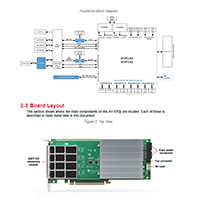
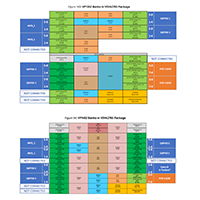
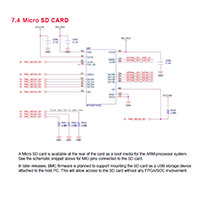
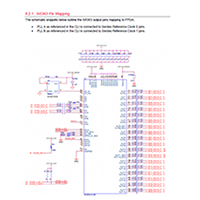
Board Specifications
Adaptive SoC
- Versal Premium
- VP1402/VP1502/ VP1552
- Core speed grade - 2
- Contact BittWare for other FPGA options
On-Board flash
- Flash memory for booting FPGA
External memory
- 2x 8GB LPDDR4 chips (16GB total) @ 4266MHz (64 bits) accessible to ARM and FPGA logic via NOC
- 432 MB of ultra-low-latency GSI SRAMs (optional)
- 12x 18-bit chips
- 216-bit total bus width
Host interface
- PCIe Gen5 x8x8 (bifurcated) or PCIe Gen4 x16 connected to PCIe w/DMA (CPM5) Hard IP (VP1502/VP1552)
- PCIe Gen5 x4x4 (bifurcated) or PCIe Gen4 x8 connected to PCI Express Hard IP (VP1402)
I/O Expansion
- I/O expansion site connected to FPGA via 48x SerDes channels
- 2x ARC6-16 connectors connected to FPGA via 8x SerDes channels each (16x total)
QSFP-DD Module
- Default I/O module features 4x QSFP-DD cages on front panel supporting 56G PAM4 (uses 32x SerDes)
- Additional custom modules available. Contact BittWare.
Clocking
- 2x Jitter cleaners for network recovered clocking
- 2x 1PPS (in-board)
USB
- USB access to BMC, USB-JTAG, USB-UART
Board Management Controller
- Onboard CLI
- Python, C++ API (contact BittWare)
- 200 Mbps parallel port connected to the FPGA fabric and the NOC
- USB SD Card Reader for simple OS images transfer to ARM processors
- Fast FPGA Boot Flash programming
- Temperature, voltage, current monitoring
- SNMP agent for centralized management
- Dedicated preprogrammed array of 32 MAC addresses
- I/O ports monitoring. Full QSFP, SFP, QSFP-DD access and programming through CLI and API
- CLI-based clock selection supporting custom clock configurations
Cooling
- Standard: dual-width passive heatsink
Electrical
- On-board power derived from 12V PCIe slot and 2x AUX connectors
- Power dissipation is application dependent
Environmental
- Operating temperature: 5°C to 35°C
Form factor
- Standard-height, 3/4-length, dual-width PCIe card
- 10 x 4.37 inches (254 x 111.15 mm)
Development Tools
Application development
- Supported design flows -Vivado Design Suite (HDL, Verilog, VHDL, etc.)
r0 v17
Order Your Cards in a TeraBox™ FPGA Server
Get extended warranty support and save time with a pre-integrated solution!
Ready to Buy?
Product availability for online ordering from Mouser Electronics:
Interested in Pricing or More Information?
Our technical sales team is ready to provide availability and configuration information, or answer your technical questions.
"*" indicates required fields


